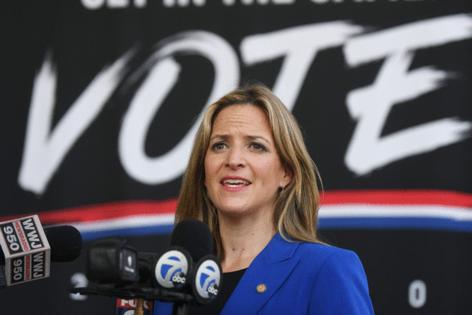Michigan Supreme Court largely upholds Benson's poll challenger guidance
Published in News & Features
LANSING, Mich. — The Michigan Supreme Court ruled Wednesday that guidance issued by Secretary of State Jocelyn Benson governing procedures for Michigan election challengers was largely developed properly and most of the instructions can remain in place for the Nov. 5 presidential election.
The high court's 4-3 ruling along party lines held that Benson had the authority under Michigan election law to issue the guidance on election challenger credentialing and requirements regarding how and to whom challenges are reported without going through a longer rules-making process.
“Under the Michigan Election Law, the secretary of state is the chief election officer of Michigan, and as such, the secretary has supervisory control over local election officials in the performance of their duties,” Justice Kyra Harris Bolden wrote in the majority opinion for the court's four Democratic-nominated justices.
The case stems from a lawsuit filed by several election challengers and the state and national Republican parties that challenged a manual issued by Benson to clerks in 2022 that set out instructions for election challengers. Among that set of instructions were a uniform credential form for challengers, limits on when their challenges should be recorded and bans on electronic device possession in closed-door absentee voting counting rooms while polling precincts are open.
The GOP plaintiffs in the case argued the requirements conflict with state election law and constituted rules that should have gone through the state's rulemaking process.
The Court of Claims sided with Republican challengers in October 2022, but the Supreme Court suspended the effect of Judge Brock Swartzle’s ruling for the November 2022 election because justices felt it was too late to issue new training guidelines. The Court of Appeals affirmed the Court of Claims decision in October 2023, pushing the issue back into the lap of the Michigan Supreme Court.
The election challenger case before the Supreme Court isn’t the first instance of Benson’s guidance to clerks being challenged on the grounds that it sidestepped the required rulemaking process. Plaintiffs successfully challenged guidance on absentee signature verification in 2021, and the secretary was required to go through the lengthier rulemaking procedure.
In 2020, Benson's decision to mail out unsolicited absentee ballot applications to all of Michigan's registered voters was challenged, but ultimately upheld by the Court of Claim and Court of Appeals. Ahead of the 2020 election, courts also blocked policies Benson was involved with that would have banned open carry at polling locations.
In Wednesday’s decision, justices argued Michigan election law provides Benson “with a degree of discretion” in developing instructions for poll challengers and absentee voter counting boards.
Requiring a uniform credential form for challengers does not change or materially alter the qualifications challengers must meet to be eligible, the ruling said. Likewise, the majority ruled, the law requires challenges to be made to “an” election inspector, not “any” election inspector, clearing the way for Benson’s guidance designating a challenger liaison to whom challengers report.
Election inspectors who receive a report cannot decline to report a challenge “on the basis of their personal assessment of the validity or merit of the challenge,” the high court ruled. In that sense, the secretary must clearly state in guidance what type of challenge is considered “permissible” or “impermissible” and remove allowances for “personal assessment.”
“While election inspectors have implicit authority to determine whether a challenge is one under MCL 168.727(1) such that they are required to record it, they cannot decline to record a challenge on the basis of their personal assessment of the validity or merit of the challenge,” the ruling said.
The question of cell phones in absentee voter counting rooms is moot, the Michigan Supreme Court ruled, because the Legislature amended the law with clearer guidance on possession and use of electronic devices in those spaces.
In a dissent, Justices Elizabeth Clement, a Republican-nominated justice, said she disagreed with the majority because she believed the credential form, the challenger liaison requirement, challenger recording guidance and guidance allowing for the removal of a challenger for repeatedly filing "impermissible" challenges were in conflict with Michigan's election law.
Justice Brian Zahra, another Republican-nominated justice, also disagreed with those rules, not only on the grounds that they violate election law, but also because they constituted rules that should have gone through the administrative rulemaking process.
The guidance, Zahra wrote, constituted "rules that were created without any public discussion, accountability, or transparency, as required by the APA (Administrative Procedures Act)."
_____
©2024 The Detroit News. Visit detroitnews.com. Distributed by Tribune Content Agency, LLC.







Comments